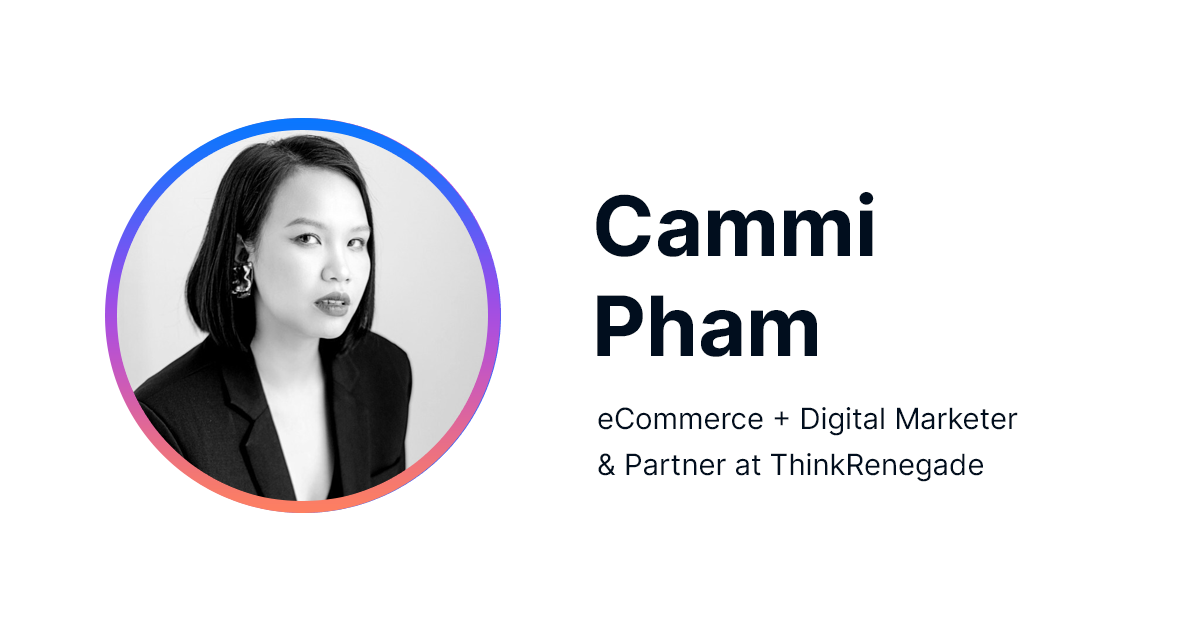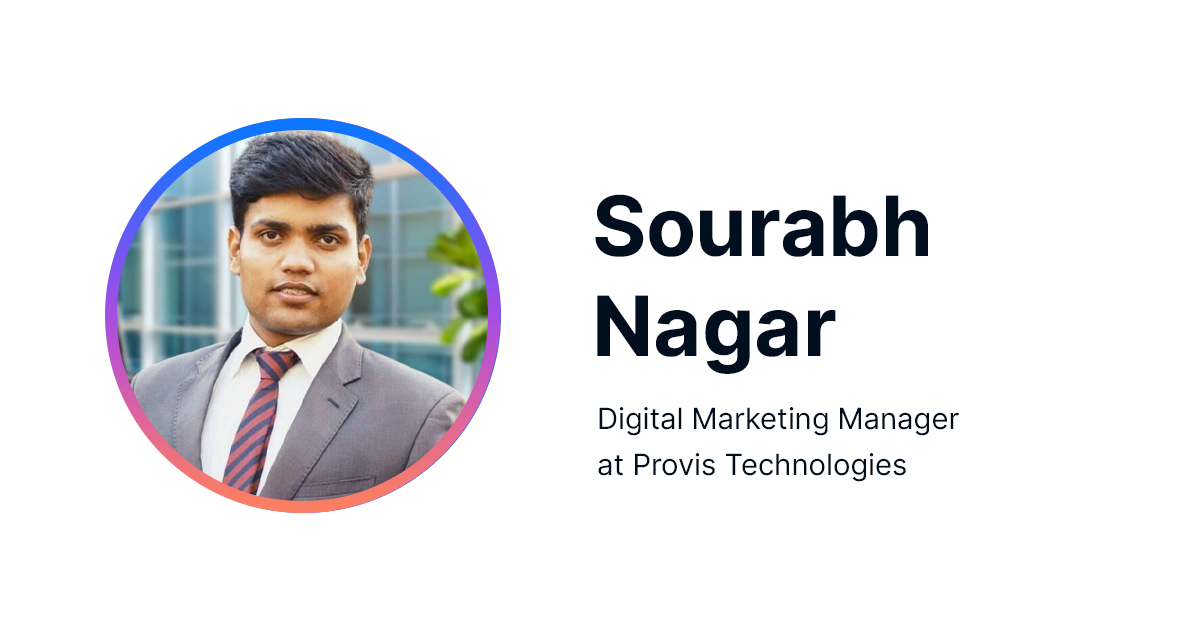Since the period we started developing TextCortex, we have connected with some of the best eCommerce experts we’re working with every day.
These experts are some of the best individuals in their industries, and not only that, they are globally recognized and made incredible results and impact in the eCommerce industry.
In this interview article, we asked some of our top eCommerce experts to reveal their winning secrets.
Here's what they shared with us.
1. Cammi Pham

BIO: I’m an unlearner, a dreamer and a digital nomad. I split my time between NYC, Asia and Europe with my best friend and sister Vivien. I’m a partner at ThinkRenegade, where we help businesses scale with data-driven marketing. My writing focuses on unlearning, personal development, self-education, philosophy, and productivity tips.
#Q1: What SEO techniques generate best results for Ecommerce businesses in 2022?
In the past few years, great relevant content has become the most important part for SEO.
All the search engines have been working hard to reward websites with high-quality content that is relevant to their audience.
Over time, this content helps to drive more and more relevant buyers to the website and the e-commerce builds a better reputation with its community and search engine.
Another bonus point of creating great content is that you can easily repurpose them for other platforms such as email, ads, and social media.
We have seen great results from repurposing SEO content into other forms of content.
#Q2: In your opinion, what are the biggest (upcoming) changes and trends in e-com?
Live shopping is going to be one of the biggest trends in e-commerce. It has been extremely popular in Asia.
It is a great way to interact with your customers in real-time. Customers are seeking a more authentic relationship with brands.
In the upcoming year, AI technology will become more sophisticated. This will allow the average shop owner to market their brands easier which will also increase competition.
This increases the importance of great creative and quick turnaround in order to compete in the market. Brands need to produce great content at lightning speed to stand out and reduce the acquisition cost.
Lastly, with an increased focus on consumer privacy from Meta, Google and Apple, it is extremely important for e-commerce brands to own their customer data.
The government and tech giants will introduce many new policies to make it harder for you to track and market to your own audience.
The more direct access to your customers, the safer it is for your brand in the long run.
#Q3: Which marketing tools would you recommend for Ecommerce merchants and why?
When it comes to email marketing for ecommerce, Klaviyo is always the best. I am excited about their focus on AI and how to leverage it for email marketing and advertising.
If you want to take AI’s predictive audience to the next level, you want to check out BlackCrow AI.
In a landscape where we keep losing access to tracking and data, getting more insight about visitors’ behavior as they shop in real-time is especially valuable.
It helps reduce advertising spending and creates a more tailored customer journey.
2. Christoph Filgertshofer

BIO: Christoph Filgertshofer - Entrepreneur & Founder of "ChrisFil" - He supports emerging eCommerce businesses with tips, tricks & his experience from building & scaling online stores to millions in sales.
#Q1: What SEO techniques generate best results for Ecommerce businesses and Shopify in 2022?
I think it's a great way for e-commerce businesses to level up their SEO efforts with insightful content and infographics based on their own data.
For example, we once sold personalized friendship mugs and created an infographic with the most common name pairs for friends.
Our audience loved the piece, and it was shared all over social media, which produced a crazy ROI with a production cost of <$50.
#Q2: In your opinion, what are the biggest (upcoming) changes and trends in e-com and Shopify?
I think it becomes increasingly important to look at the longevity of a customer.
As tracking gets harder and CPAs rise, merchants need to focus on the backend to build a brand people buy regularly.
Lifetime values can be increased in a number of ways, but what I see promising are subscriptions.
A great way to increase CLTV and create sustainable recurring revenue.
#Q3: Which marketing tools would you recommend for Ecommerce merchants and why?
It's not easy to give a general answer as e-commerce businesses differ a lot from each other.
But I can say that it's very important for every store to look at how they can diversify their marketing spending - IOS 14 hit hard, showing how bad dependency on one platform could be.
So looking into TikTok, Pinterest, or traditional approaches like Advertorial is definitely worth it.
3. Harry Dance

BIO: Harry Dance is the Digital Marketing Director for Kayo Digital, a digital partner to companies looking to evolve through technology. He helps people do better marketing through his writing, events, and speaking.
#Q1: What SEO techniques generate the best results for E-commerce businesses in 2022?
Search engines have changed, and the technology running them has, but one thing hasn’t; the need to create content to get in front of the audience that matters to you.
However, we can’t be lazy and write about what we want anymore. We need to write for the user and situation within SERPs.
Within SEO, there is now an unprecedented need to research your topics, the keywords and how competitive the SERPS are before you put “pen to paper.”
Because when you write around topics that your competitors do not cover, that have a significant sum of searches, and generate a buying intent from a user, you find yourself with low-hanging fruit.
The strategy is not just for driving traffic to your researched and written pages.
Including internal links to the products, collections, and categories generates a positive user experience that also benefits how your products appear in search results.
#Q2: In your opinion, what are the biggest (upcoming) changes and trends in e-com?
The most significant upcoming isn’t strictly just SEO. As SEO experts, we need to do the best for the customer.
With data privacy, limiting the information readily available to a company’s owned data, such as an email database, becomes increasingly important.
Because of this, an SEO professional’s ability to encourage people to sign up for a newsletter/loyalty scheme will become increasingly important.
Especially as it will be able to contribute to a client's lifetime value positively.
The second biggest challenge and the trend is understanding and comparing data from the past few years.
COVID and its change in consumer behavior mean we will struggle when we’re looking to reach year-on-year data, and I wouldn’t advise it.
Consumer demand online has rapidly grown and decreased month on month, and we now must look for clues towards consumer demand and success metrics in the immediate future.
Has the search for branded terms increased/decreased simultaneously with non-branded terms?
If so, can we attribute it to consumer demands? If not, is there something we need to investigate?
Where do we believe sales will come from in the future?
These are just a few questions that will need to be discussed while understanding what information you need in the short and long term.
#Q3: Which marketing tools would you recommend for E-commerce merchants and why?
The top five tools I would recommend for any e-commerce merchants are:
1. Google Search Console (cost = free)
Google Search Console enables you to educate Google on your website’s sitemap, understand the terms you’re currently appearing within the top 10 pages of Google for, and what pages on your website are the most successful, helping you understand how to prioritize the pages and terms, and how Google interprets your website.
2. Loyalty Lion (cost = free to £1200 a month)
Reward your customers with points and discounts every time they buy or refer a friend, which will help increase the lifetime value of a customer and grow your customer base.
3. One trust cookie (cost = 7.99 a month)
A tool that ensures your website is GDPR compliant through a cookie banner.
Privacy is and will continue to be a “hot topic” that will need to be considered if you haven’t already.
4. Trustpilot (cost = free to X a month)
When someone who doesn’t know you comes to your website, you’ll need to establish credibility. The best way to do this is through a third-party review system.
5. Email marketing software (cost = ranging)
The final recommendation but one of the most important ones, is email marketing. Seemingly dead to some BUT thriving in e-commerce.
Build it, and they will come has and will never work in the e-commerce world.
Email marketing is one of the most vital tools to encourage people back to your website, and I don’t have a preference because of each.
There are plenty more tools out there, and a special shout-out goes to things like SEMrush and Google Analytics 4, but the above five tools will give you the foundations of a website that can grow and engage its customer base.
4. Sourabh Nagar

BIO: Sourabh is an experienced branding and digital marketing service, provider. He is specialized in SEO, SEM, PPC, SMM, Lead Generation, E-Commerce marketing, Email marketing, and Online Reputation Management. Currently, he is occupying the position of Digital Marketing Manager in Provis Technologies with a successful track record.If you want to learn more, you can visit provistechnologies.com.
#Q1: What SEO techniques generate the best results for E-commerce businesses in 2022?
- You need to focus on Fundamentals. Fundamentals are not basic SEO. It actually includes executing all important fundamental factors of SEO and Not to follow any tricks
- It includes On-Page SEO, Technical SEO, Advance SEO (such as Schema Markups for Rich snippets)
- Only Quality Guest posts - try to focus on only Contextual and Quality Guest posts from the relevant websites with High Domain Authority and Focus mostly on Content Marketing through Articles, Blogs, Brand Mentions, Reviews, and Reputation Management
If you follow the above three points, you will definitely outrank most of your competitors, and then gradually, you will understand and execute better things since your foundation of E-Commerce SEO was established in the right direction.
#Q2: In your opinion, what are the biggest (upcoming) changes and trends in E-com?
The biggest upcoming changes or trends in E-Com industry would be to enhance the customer experience journey through your e-commerce store, whether it includes the Integration of Augmented Reality, Artificial Intelligence, Location and Preference-based Pages Landing Pages, etc.
Customers are getting aware of the E-commerce scenario, and definitely, everyone does not want to get sold. Hence we need to provide extensive value and an amazing customer experience, and the most important goal is to capture and retain customers' attention to the E-com platform most of the time.
#Q3: Which marketing tools would you recommend for E-commerce merchants and why?
Here E-Commerce can be anything, and it may include third-party platforms such as Amazon, Walmart, Wayfair, etc. Or it can consist of the Individual e-commerce store of the brands such as Shopify, WordPress, Magento, Custom Programmed stores on PHP, Python, etc.
The platform selection is as per the needs. However, if you are just starting, then I would recommend Shopify and WordPress,
Now when we talk about tools, it includes the tools related to various objectives, hence some of the quality tools for e-commerce include:
- Crazy Egg,
- Google Tag Manager,
- Search Console, Analytics,
- Adobe Marketing Cloud,
- Jetpack,
- WP Rocket,
- Ahrefs,
- SEMrush,
- Majestic, etc.
5. Elliott Prendy

BIO: Elliot Prendy is an entrepreneur, Youtuber, and online marketer who successfully created his own business. His Youtube channel is dedicated to creating an online resource that allows people from all walks of life to take control of their financial situation and start their very own business venture. His specialization is in E-commerce and dropshipping on Shopify.
#Q1: What SEO techniques generate the best results for Ecommerce businesses and Shopify in 2022?
When it comes to SEO, you have to be precise and consistent to optimize each product to show up in search rankings.
That means writing in-depth product descriptions that target unsaturated keywords, writing great meta descriptions and using all of the possible words you can (not cutting your descriptions off short), and making sure your product images are optimized for SEO (adding product keywords to the image files themselves and the alt tags).
Try to add products to your Shopify store that can help you stand out in search. These are less saturated products in the market, making it easier for a store to rank them.
Try getting your eCommerce store published on reputable websites.
You can use services such as Brand Featured to get your eCommerce store mentioned on news sites such as NBC, FOX & CBS.
If you do all of this consistently and post to social media regularly, your store has a high chance of gaining more traffic from searches.
#Q2: In your opinion, what are the biggest (upcoming) changes and trends in e-com and Shopify?
I believe one huge trend coming to eCommerce and Shopify over the next few years will be the integration of augmented reality, virtual reality & 3D.
Adding augmented reality to your store will allow customers to test your products in real-time without making the purchase.
For example, customers can see what a piece of furniture will look like in their house using AR before even purchasing it.
Likewise, customers can try out an outfit from a fashion store using AR without wasting time purchasing it, trying it on, and then returning it if they don't like it.
I have started implementing 3D on my custom suits store Finley Brice using the Angle3D Shopify app.
This allows customers to see a realistic version of their custom suit before purchasing.
I believe all stores need to look into utilizing AR, VR & 3D to improve their customer experience, which in turn should increase sales and reduce extra efforts with customer service and refunds.
#Q3: Which marketing tools would you recommend for Ecommerce merchants and why?
Of course, the big one will be TikTok, which is exploding at the moment.
So, at least utilizing short-form content will be the way to go for the next few years.
However, I would say content aggregation should be a big focus.
So this basically means creating one piece of content and sharing it across many platforms.
A YouTube video can be cut down into smaller videos and shared on Instagram Reels, TikTok, YouTube Shorts, Snapchat, Pinterest, and so on.
This will allow for the maximum exposure of your store.
I also believe that every brand will now need a face to represent them online – the days of faceless brands are starting to die.
So, you will need someone your audience can relate with to create and engage your community.
Customers more than ever want to feel represented and like they have a reason to buy from your brand, so having a genuine connection with your audience will go a long way to helping you grow your store and brand.
Finally, having payment plans is essential for any store looking to grow.
Payment processors such as Klarna, Clearpay, Laybuy, and so on are key to allowing customers to pay flexibly and helping you increase your sales.
To sum Up
With a predicted CAGR of 14.7% from 2020 to 2027 in the eCommerce industry, only businesses that are learning and adapting fast will survive this period.
It’s up to you to use these strategies, learn from them and implement them for your business to benefit from this roundup.
We hope you enjoyed these expert insights, and we hope they gave you a better understanding and ideas about eCommerce strategies that you will implement immediately.
.jpg)
